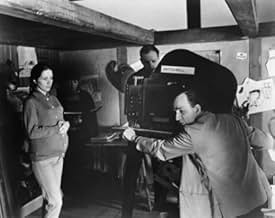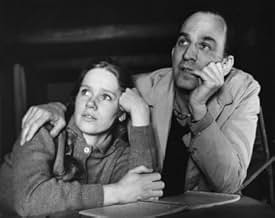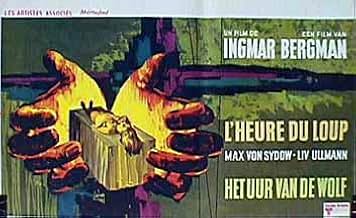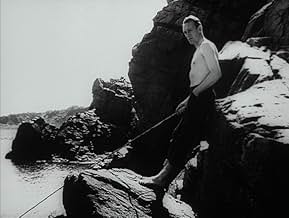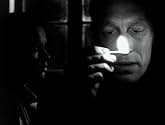NOTE IMDb
7,5/10
24 k
MA NOTE
Lors de vacances sur une île scandinave isolée avec sa jeune femme enceinte, un artiste âgé fait une dépression nerveuse tout en affrontant ses désirs refoulés.Lors de vacances sur une île scandinave isolée avec sa jeune femme enceinte, un artiste âgé fait une dépression nerveuse tout en affrontant ses désirs refoulés.Lors de vacances sur une île scandinave isolée avec sa jeune femme enceinte, un artiste âgé fait une dépression nerveuse tout en affrontant ses désirs refoulés.
- Réalisation
- Scénario
- Casting principal
- Récompenses
- 2 victoires au total
Agda Helin
- von Merken's Maid
- (non crédité)
Lenn Hjortzberg
- Kreisler
- (non crédité)
Mikael Rundquist
- Boy in Dream
- (non crédité)
Folke Sundquist
- Tamino
- (non crédité)
Avis à la une
Our early encounters with Johan Borg, played by the enigmatic, Max von Sydow do not encourage our sympathy. The painter seems troubled but boorish with it and something of a bully. Liv Ullmann is wonderful as his long suffering wife, Alma, and really tries to help her husband overcome his illness. This is the reason they are on the (deserted?) island, to give him a chance to overcome his demons. And what demons! For the first half of the film we are about as bemused as Alma as to what is going on with all the various encounters, but as the film progresses we are drawn in further, as is she. The artist overcome by his own creative imaginings or a sick man struggling with his nightmares? Can one tell the difference in the end? As the two main characters finally fall in together, dragging us with them a full blown Gothic melodrama opens up and almost engulfs us all. Most original and horrifying work. I don't know if it was just me but I had to play this with 'hard of hearing' English as I could find no other English track on the DVD.
a lot of even of the most loyal bergman fans claim that they came away from this one confused and irritated, and found it lacking in meaningful symbolism. i wonder if they watched the same movie i did?? this is just about one of the most intriguing, imaginative horror movies i've ever seen, and it is indispensable for those who enjoy the occasional dip into the proverbial pool of cinematic madness and mental derangement. i'm not in uncritical praise of everything bergman made, and some of his movies are admittedly a bit heavy handed and depressing, but i see this one as an example of what he could do when he decided to go all out. johann (max von sydow) and alma (liv ullmann)are husband and wife, and sydow's character is basically a tormented artist who has moved to the deceptively serene and quiet island with his wife to collect himself and try to escape his personal demons. to say the least, it doesn't exactly pan out that way. i believe the constant darkness and atmosphere of chaos and fear in the film is a metaphor for the human condition, because when you really reflect on it, we can never tell if the impressions we get and the ideas we have are projections of our imaginations or have some basis in reality, just as johann and his loyal wife cannot tell if these superficially amiable but suspiciously odd people are really there or are illusory creations of his mind. lindhorst, 'the birdman', is a particularly chilling character, and i would venture to say that the scene in which he puts on a puppet show for the couple and the rest of the socialites/demons is the key to the film. lindhorst creates a scene from mozart's "the magic flute", and recites (during a truly haunting close up), the dialogue from a scene crucial to the meaning of the symphony. one of the crucial characters, tamino (and anyone into mozart will understand what i'm talking about)collapses in the *palace of wisdom*, that is, a terrible place where he has discovered the tragic truth about human life and it's meaninglessness, and asks desperately "when will mine eyes the daylight see?" lindhorst is quick to recite the reply:"soon, soon fair youth..or never." he then goes on to talk about how mozart was terminally ill at the time of it's composition, and i would not be surprised if this entire scene was a metaphor for the artists' struggle with the fact of death and it's crushing finality:how can the creative individual, more sensitive to the issue of ultimate meaning as regards the human condition, be content or happy with anything when he knows that the world just might be and probably is what thomas carlyle called it, "an uncaring hall of doom"? how can we be sure of our meanings, when they could be wishful projections of our own minds, when the beliefs we have about ourselves and others cannot be purely objective or subjective? if this is the case, don't we necessarily live in a shadow house of illusions and absurdities? anyone with half a brain can see that there IS existential symbolism in this film. rich, unbearably tense, masterful horror and surrealism at it's finest. buy it.
Much like F.W. Murnau, or even David Lynch for that matter, Ingmar Bergman can create horror in a film, such as his rarity in the genre of Hour of the Wolf (no, no werewolves boys and girls, the title refers to something else entirely regarding the middle of the night), by imposing images that are so unbelievable as to either frighten or annoy. Bergman is no stranger to the surreal (Persona his most notorious feat, but surrealism lurks in many Bergman works), and Hour of the Wolf displays his skills at it with a precision that is un-canny. We're given a couple of characters thrust (not entirely by accident) into a strange atmosphere of people, locations, shadows, the night. And with this film, the audience is given images and scenes that are very new, even for a modern audience, but most of the film brings one back to the most chilling of the silent-film horror classics. But that's not to say this is a relatively accessible Bergman film, unless you are very much into the genre.
Max Von Sydow and Liv Ullman give strong performances as a couple (one an artist the other his pregnant wife) who arrive on an island to have some peace, where he can get some work done. But this is not the case as Von Sydow's character goes through a kind of deconstruction in the night- he can't sleep, he's shaken to intense uncomfort by neighbors, and a particular memory haunts him all the time (and once Bergman shows what it is, it becomes one of the most horrifying scenes I may have ever seen). If there is a climax to the film it's difficult to discern- the only flaw I had with the film, that sometimes it's almost TOO bizarre- however what leads up to it is a skillful work at experimental theatricality. Everything seems real enough to draw the audience in, and everything seems un-real enough for the audience to be disconnected enough to understand the surreal nature. To put it another way, it's a good film to scare the hell out of you as a midnight movie.
Max Von Sydow and Liv Ullman give strong performances as a couple (one an artist the other his pregnant wife) who arrive on an island to have some peace, where he can get some work done. But this is not the case as Von Sydow's character goes through a kind of deconstruction in the night- he can't sleep, he's shaken to intense uncomfort by neighbors, and a particular memory haunts him all the time (and once Bergman shows what it is, it becomes one of the most horrifying scenes I may have ever seen). If there is a climax to the film it's difficult to discern- the only flaw I had with the film, that sometimes it's almost TOO bizarre- however what leads up to it is a skillful work at experimental theatricality. Everything seems real enough to draw the audience in, and everything seems un-real enough for the audience to be disconnected enough to understand the surreal nature. To put it another way, it's a good film to scare the hell out of you as a midnight movie.
The painter Johan Borg (Max von Sydow) and his wife Alma Borg (Liv Ullmann) have been married for seven years and are living in an island. Johan is haunted by nightmares of his past. Through his notes in his diary, his wife realizes his madness process. In the end, after living with him for such a long period, she questions her sanity and what is real.
This impressive and disturbing movie about the lost of sanity by a tormented artist is another magnificent work of Ingmar Bergman, again with his favorite actor (Max von Sydow) and actress (Liv Ullmann). A very Gothic and dark horror movie, it is a frightening view of the mind of a mad person. My vote is eight.
Title (Brazil): 'A Hora do Lobo' ('The Hour of the Wolf')
This impressive and disturbing movie about the lost of sanity by a tormented artist is another magnificent work of Ingmar Bergman, again with his favorite actor (Max von Sydow) and actress (Liv Ullmann). A very Gothic and dark horror movie, it is a frightening view of the mind of a mad person. My vote is eight.
Title (Brazil): 'A Hora do Lobo' ('The Hour of the Wolf')
10neil-313
This seems to be one that divides fans of the master, but I loved it. It's easy to see why people see this as being a bit of an odd-one-out in Bergman's output: it's very direct in it's depiction of disturbed states of mind, directly illustrating hallucinatory states rather than just hinting at them. Others have pointed to references to other films of the horror genre, which seem undeniable.
Not that you'd mistake this for a film by anyone but Bergman. It's rich in connections with other of his films and autobiographical references (such as the terrifying description of being locked in a cupboard as a child). It can be reasonably thought of as Bergman's 'horror film' but he takes on the genre very much on his own terms.
It's a film that lingers long in the mind, with many unforgettable scenes (including the amazing Magic Flute scene) aided by Sven Nykvist's wonderful chiaroscuro photography. The use of music is (as ever with Bergman, the most musical of directors) extremely intelligent: the scene with the boy is set apart from the rest as much by the music as the photography.
Given the quality of the cast, you'd expect superb performances. As ever, von Sydow and Ullmann are excellent, with equally good supporting performances.
At times I was reminded of Rilke's only novel, The Notebook of Malte Laurids Brigge. If you don't know this, I urge you to seek out a copy: there's a distinctly Bergmanesque atmosphere to the whole work, but there are specific images that seem to link to this film.
This is a film that repays repeated viewings. Despite it's extremely disturbing subject matter, to me it's not as emotionally draining as many of Bergman's other films (such as Shame or Winter Light), in spite of (or perhaps because of) the visual horrors on display. Still, I recommend it very highly.
Not that you'd mistake this for a film by anyone but Bergman. It's rich in connections with other of his films and autobiographical references (such as the terrifying description of being locked in a cupboard as a child). It can be reasonably thought of as Bergman's 'horror film' but he takes on the genre very much on his own terms.
It's a film that lingers long in the mind, with many unforgettable scenes (including the amazing Magic Flute scene) aided by Sven Nykvist's wonderful chiaroscuro photography. The use of music is (as ever with Bergman, the most musical of directors) extremely intelligent: the scene with the boy is set apart from the rest as much by the music as the photography.
Given the quality of the cast, you'd expect superb performances. As ever, von Sydow and Ullmann are excellent, with equally good supporting performances.
At times I was reminded of Rilke's only novel, The Notebook of Malte Laurids Brigge. If you don't know this, I urge you to seek out a copy: there's a distinctly Bergmanesque atmosphere to the whole work, but there are specific images that seem to link to this film.
This is a film that repays repeated viewings. Despite it's extremely disturbing subject matter, to me it's not as emotionally draining as many of Bergman's other films (such as Shame or Winter Light), in spite of (or perhaps because of) the visual horrors on display. Still, I recommend it very highly.
Le saviez-vous
- AnecdotesBergman defines "The Hour of the Wolf" as "The time between midnight and dawn when most people die, when sleep is deepest, when nightmares are most palatable. It is the hour when the sleepless are pursued by their sharpest anxieties, when ghosts and demons hold sway. The hour of the wolf is also the hour when most children are born." According to "Films in Review" critic Henry Hart in the U.S. it's about 4 a.m. when the body's resistance is least.
- Versions alternativesThere exists an earlier version of the film with an additional, meta-cinematic framing device. In the prologue (lasting about 7 minutes), Bergman is seen on the set directing his actors. The epilogue (lasting about 1 minute) shows us the set being torn down and the crew leaving. These sequences are the only differences to the commonly seen version. Bergman has stated in an interview that he cut off these sequences himself before the general release of the film, as he came to the conclusion that they were just "self-deception". Despite this, a Swedish 35 mm print of the original, longer version does exist, although it's not available on home video in any format.
- ConnexionsEdited into 365 days, also known as a Year (2019)
Meilleurs choix
Connectez-vous pour évaluer et suivre la liste de favoris afin de recevoir des recommandations personnalisées
- How long is Hour of the Wolf?Alimenté par Alexa
Détails
- Durée1 heure 28 minutes
- Couleur
- Mixage
- Rapport de forme
- 1.37 : 1
Contribuer à cette page
Suggérer une modification ou ajouter du contenu manquant

Lacune principale
By what name was L'Heure du loup (1968) officially released in India in English?
Répondre

